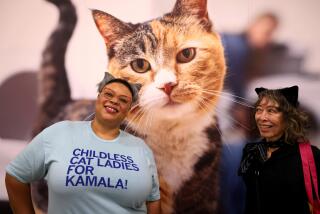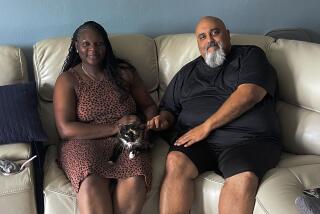Catty Remarks Aside, These Pets Are Back in a Big Way : Animals: To their owners, Maine coons are smart and affectionate. To their detractors, they’re an unsophisticated lot. But both agree, the cats are HUGE.
- Share via
After decades of derision and neglect, Maine coons are making a big comeback.
The key word here is big .
For people unfamiliar with felines, Maine coons have very little to do with the state of Maine, and almost nothing to do with raccoons. Maine coons are a kind of cat--in some ways like ordinary, everyday house cats. They have bushy tails and stand-up ears and come in almost every color of the cat rainbow except Siamese tan. But in at least one respect Maine coons are an entirely different breed of cat.
They’re big--really, really big. While the average, run-of-the-mill, yowling-in-the-alley cat weighs about six or eight pounds, Maine coons average twice that--and some Maine coons tip the scales at 28 pounds or more.
It was the Maine coon that held court recently at the Peck Community Center in San Pedro, where a cat show, titled Purrin’ at the Ritz, featured an estimated 50 or so Maine coons on display.
Maine coon supporters contend that this breed is smarter than the average cat. For example, Linda Flores of Gardena, who owns a 1 1/2-year-old Maine coon named Genghis Khan, swore that Genghis “comes, he sits, he stays. He can open cupboards and doors.”
To hear Flores tell it, Maine coons are the Einsteins of the cat world. Of course, in the bitterly partisan world of cats, it’s likely that other breed supporters would disagree.
The origins of the Maine coon cat are somewhat shrouded in mystery. According to most sources, Maine coons were created when European longhaired cats brought to Maine in the early 19th Century got frisky with local shorthaired cats that had gone wild. Because of their long hair and enormous size, legend had it that Maine coons were a mix of cats and raccoons, a theory dismissed by biologists. Other people say the name Maine coon derives simply from the breed’s geographic origins and the ringed tails of the early Maine coons.
Whatever their origins, Maine coons were highly esteemed in early America for their mousing abilities, for obvious reasons: A big cat can eat more mice than a little cat. But while they may strike terror in rodents, Maine coons are extremely gentle and affectionate with humans--”the gentle giants of the cat world,” as Wini Keuler of the American Cat Fanciers Assn. puts it.
Maine coons were an extremely popular breed throughout the 19th Century; in fact, according to Carol Lawson of Casselberry, Fla., who is the Maine coon “breed committee chairperson” for the ACFA, a Maine coon won best cat honors at America’s very first cat show in 1898.
Shortly thereafter, however, Maine coons began to fall out of favor with cat show judges--Lawson blames this on the introduction of the haughty Persian breed--and Maine coons eventually disappeared from the cat show circuit. It wasn’t until the late 1960s and early 1970s that Maine coons were once again recognized by the major cat associations.
Now, according to Lawson, Maine coons are the third most popular breed of registered cat in America, behind Persians--or, as Lawson refers to them, “the P word”--and Siamese. Others dispute this, however, saying that Maine coons rank no better than fifth in popularity.
But regardless of their current popularity ranking, most Maine coon owners seem to agree that it hasn’t been easy for Maine coons to claw their way back to respectability in the cat world.
“We get called a lot of names,” Lawson says. “A lot of people call it a barn cat. I’ve had judges say to me, ‘What do you want to breed those things for?’ That’s the worst thing we’ve had to overcome.”
The discrimination against Maine coons often is said to be regional. For example, according to Lawson, “in California it’s been very difficult to win (at a cat show) with a Maine coon cat.”
In fact, according to Anita Ballard of Long Beach, who breeds Maine coons, until last year there wasn’t a cat club on the West Coast that was dedicated to Maine coons. Ballard and some other Maine coon partisans solved that problem by creating the Maine Event Cat Club. Ballard, who owns a 26-pound Maine coon named Blue Suede Shoes, says the club has about 50 members “and is growing all the time.” The purpose of the club, Ballard says, is to “promote and protect the breed.”
“We try to have a nice, friendly club,” Ballard says. “We try to keep the Maine coon politics out of it.”
That Maine coons--or any cat, for that matter--would constitute a political question will come as no surprise to those familiar with the strife-riven world of pedigreed cat shows and cat associations. The three largest cat registry associations in America are the Cat Fanciers Assn. (CFA), the American Cat Fanciers Assn. (ACFA) and The International Cat Assn. (TICA). TICA is a breakaway group from the ACFA, which is itself a breakaway group from the CFA. Cat associations seem to suffer schisms at the drop of a cat.
Some Maine coon owners maintain that Maine coons get a better shake from TICA and the ACFA than they get from the CFA. Merilee Davis of the New Jersey-based CFA denies this, although she admits that “our rules for registration may be a little more stringent” than those of the other, upstart associations.
Still, Maine coon politics and “barnyard cat” aspersions aside, it’s clear that Maine coons are enjoying a resurgence. But if you’re thinking about getting one, there are two things to remember:
First, they’re not cheap. A good pedigreed Maine coon kitten costs somewhere in the neighborhood of $300 to $400, while a proven top show cat could run a thousand dollars and up.
And the second thing to remember about owning a Maine coon is that you’ll probably have to start buying cat food in 50-pound bags.
The Maine Coon Cat
The Maine coon cat is a native American longhaired cat, long admired for its beauty. According to the Cat Fanciers Assn., these are the qualities that judges look for in Maine coon cat competition:
* Body shape: Should be muscular and broad-chested. The body should be long with all parts in proportion to create a well-balanced rectangular appearance with no part of the anatomy being so exaggerated as to foster weakness.
* Legs and feet: Legs substantial, wide-set and in proportion to the body. Paws large, round, well-tufted. Five toes in front, four in back.
* Coat: Heavy and shaggy, shorter on the shoulders and longer on the stomach and britches. Frontal tuft desirable. Texture silky with coat falling smoothly.
* Disqualifications: Maine coons can be disqualified for having the following features: delicate bone structure, undershot chin, crossed eyes, kinked tail or incorrect number of toes.
More to Read
Sign up for Essential California
The most important California stories and recommendations in your inbox every morning.
You may occasionally receive promotional content from the Los Angeles Times.













